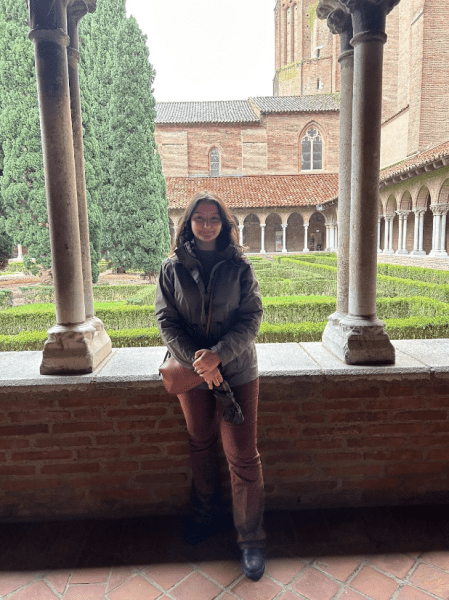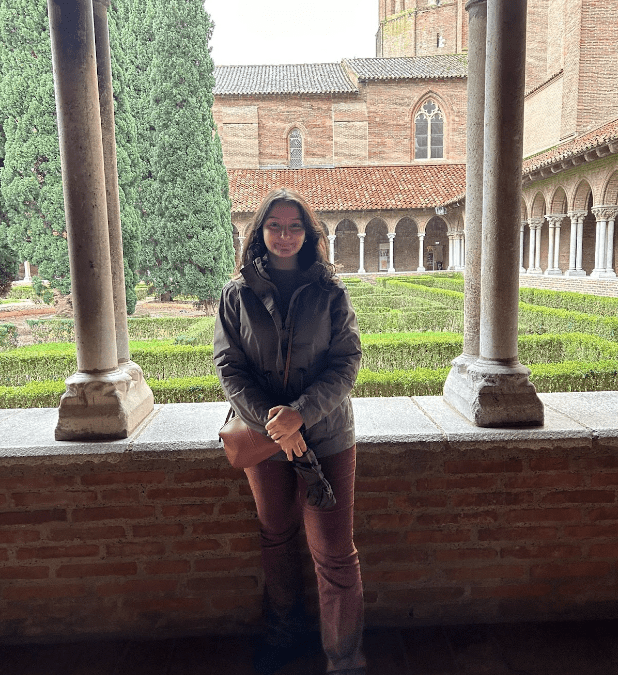
Photo of author in Toulouse, France. (Photo taken by author)
Author: Madeleine Roberts-Ganim
My name is Madeleine Roberts-Ganim, and I am a UChicago alumnus and ESL/EAL Programming Assistant for the English Language Institute. I write to you from a town of 8,000 people in southeastern France. Out my window, I see snow-covered mountain ranges and a medieval tower, a remnant of my small town’s long history. For someone raised in Iowa, one of the flattest U.S. states, the beautiful hills and valleys in this region of France have been breathtaking. I’ve been here in France since October, working as an English Language Assistant through TAPIF (the Teaching Assistant Program in France). For seven months, I get to help French middle school and high school students improve their English speaking skills. My primary role is to get students talking and, in turn, for them to hear me talk. Since I am a native speaker of English and most English teachers at my school are French, it is most valuable for students to hear my American accent and for me to assist students with pronunciation. I do help with some grammar instruction, but I mostly host discussion groups or share presentations on U.S. culture.
Last spring, I took the English Language Institute’s language pedagogy course, Teaching English as an Additional Language, or TEAL for short. This class offered me invaluable resources that I have consistently used during my time teaching here in France.
The TEAL course improved my confidence as a future teacher and helped me generate practical ideas for English language lesson plans. For our final project, we developed and demoed a 20-30 minute activity that could be used in the English classroom. While it was initially nerve-wracking to demo an activity for the other TEAL students (our classmates acting as our “students”), this experience helped prepare me for what an actual class period might be like teaching abroad. This project was not only a fantastic opportunity to create an engaging activity that could be used in the future, but it was also a chance to actually stand in front of the classroom and practice being a language instructor. Throughout the TEAL course, we were encouraged to reflect on what our “instructor identity” is and what kind of teacher we want to become. The final presentation was a moment to start growing this instructor identity and to build confidence in front of a class. Since teaching in France, I have been able to develop my instructor identity from the seed that was first planted during TEAL. In addition, the lesson plans and activities that my classmates created have given me great ideas for activities that I use in my current classroom. From role-playing activities to grammar games, TEAL gave me a wonderful arsenal of lessons that I now modify and use for my French students.
Another lesson from TEAL that I reference all the time in my teaching is the “i+1” philosophy, developed by linguist Stephen Krashen, where “i” represents students’ current language level. TEAL taught me that teachers should create lessons at the “i +1”, which is the level just above students’ current abilities. Lessons should not rest at “i” because that would be too easy, but lessons should not be as hard as, say, “i+10” because then students will find the work impossible. This way of thinking about language learning has been incredibly beneficial to my lesson planning. At the start of my year in France, I would often create lessons that were either “i-1” or “i+10,” which weren’t very useful for my students. Over time, however, I began to get a better sense of the “i” level for each of my classes. Now, I have established what “i+1” means for my students, and this has helped me create efficient and effective class periods.

Mountain range in Saou, France. (Photo taken by author)
This is not to say that my time teaching in France has been without challenges. From culture shock to learning how to advocate for oneself in a foreign country (and a different language) has certainly been difficult. However, I love the sense of accomplishment I feel when overcoming new challenges.
For one, the French education system is quite different from the American system. This cultural difference has taken some getting used to. In France, it is much more common for teachers to lecture while students take notes. In the U.S., it is more common for students to engage in or even lead discussions during class. Because French students are not as accustomed to a discussion-centered class, it was initially challenging to encourage students to speak up and share their thoughts during our English conversations. The fact that all discussion was in a foreign language certainly didn’t make this any easier for students! However, as students grew more comfortable with me, and as I continued to positively reinforce their participation, students have become much more willing to share.
Challenges also present themselves outside of the classroom. I live at the school I teach at in the “internat,” or boarding school. While this living situation is ideal in terms of location and price, there have been several maintenance issues, such as pests, lack of heating, and dysfunctional appliances. At times, it has proven difficult to get the school’s administration to take action to resolve these issues. However, I have learned to continue asking for help and to refuse to give up! While frustrating, this has given me great practice in advocating for my needs within a bureaucracy that has other priorities.

Bridge leading up to Crest, France. (Photo taken by author)
While I still have four more months as a language assistant, I have already learned so much from this experience. I have been so lucky to get to work with fantastic students and teachers here in France. While teaching abroad comes with many unexpected challenges, I am so grateful to have had the opportunity to prepare for my time here as much as I could with the TEAL course. It has greatly increased my confidence as a language instructor, and it helped me be a better language teacher for my students.
If you are interested in becoming a language assistant, too, I would strongly encourage you to sign up for TEAL this spring! Check out a sample syllabus of the TEAL course to learn more about the language pedagogy instruction you will receive. The course is an excellent preparation for TAPIF, as well as the Fulbright English Teaching Assistantship Award, the Japan Exchange and Teaching Program (JET), and DAAD. You can register this spring on the ELI’s website.
